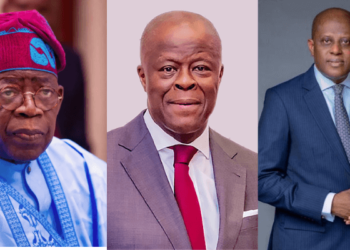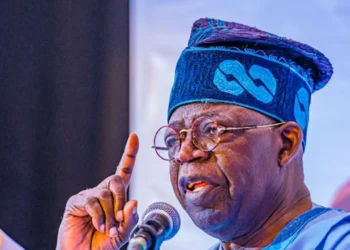By John Omachonu
As the nation awaits the release of the November inflation figures, next week by the nation’s Statistics Bureau Agency, (NBS), analysts are forecasting another increase in the annual figure to 21,4, from the current 21.1 percent, for October.
Should this happen, Bismarck Rewane chief executive officer, Financial Derivatives Company, (FDC) says, “This will be the tenth consecutive monthly increase and the highest inflation level in 17 years.”
But, the twin effects of soaring inflation and burgeoning unemployment are rapidly grooming a band of distressed consumers whose purchasing power has fallen to record lows.
In fact, Africa’s largest economy is going through a rough patch, typified by Sluggish growth in fiscal revenues, bloated debt, currency weakness, and exposure to external shocks. This has led to a wave of sovereign credit downgrades. For instance, Moody’s downgraded Nigeria to B3 from B2, and this signifies that the country is weak with a high risk of debt default and the implication could be far-reaching.
Investors could be scared leading to the possibility of flight to safety to more stable economies with greater yields like the United States.
The general consensus is that the year will end on this note that consumers remain squeezed between rising prices of goods and services and low purchasing power.
Already, most businesses have for over some months either parked shop or are just operating far below capacity utilization, due to prohibitive cost of doing business occasioned by rising cost of diesel, insecurity and decay zzzinfrastructure, among others.
“Our econometric model and market survey in Lagos show that headline inflation will rise again to 21.35% in November from 21.09% in October.
The major culprits remain the exchange rate pass-through effect on commodity prices, supply chain disruptions, and election spending. The core sub-index (inflation less seasonalities) is expected to move in tandem with headline inflation to 17.92%, while food inflation could slow by 0.30% to 23.42% on harvest effect,” Rewane said.
Propelled by cost shocks, uncontrolled importation of goods and services, inflation in Africa’s largest economy has been experiencing upward swing, leaving consumers more impoverished and sending Consumer Confidence Index (CCI) scores to a record low.
Some analysts believe that even the rate hike by the Central Bank of Nigeria, (CBN) has its own limitations due to the fragility of growth being experienced in the economy.
As long as macroeconomic fundamentals remain weak, the inflation outlook, and by implication, consumers’ confidence, will be up trending,” John Agbo, financial analyst said.
According to Agbo, giving the inflationary pressures, consumers simply do not have the wherewithal to spend.
This is because, according to him, some civil servants are being owed in some states for salaries whose worth is being eroded on daily basis, while some are without jobs.
The implication, he further said was that if the major drivers of inflation persist, purchasing power will wane and by implication, confidence generally will thin out.
Friday Ameh, energy analyst says that rising inflation and slowing or sluggish growth portends danger for the economy.
CBN’s monetary policy committee closed the curtains for the year with an additional 100bps increase to its anchor rate (16.5%pa). This is the fourth consecutive rate hike in six meetings. Overall, the MPC has increased rates by 500bps.
Commenting further on the impact of inflation, Rewane in the current FDC Economic Bulletin said, “In Nigeria, inflation has contributed towards pushing over 60% (133 million) of the population into multidimensional poverty. However, the silver lining is that the cumulative increase in rates (5%) is higher than that of inflation (3.4%). Meaning that inflation may begin to taper, albeit slowly in the near term. In addition, the aggressive stance of the CBN might just be the incentive to retain investors and moderate the speed of capital outflows.
While raising rates are good, policymakers must remember that the Nigerian economy is still limping. The IMF has revised downwards our growth forecast to 3 percent from 3.4 percent. Most importantly, the naira is languishing and contributing to 70% of the country’s inflation woes. The parallel market rate has lost 39% this year and may fall further to N820/$ from its current value of N780/$. A structured exchange rate system together with an increase in forex supply is needed now more than ever.”
Consequently, while raising interest rates may help, uncertainty and defaults are bigger dents in investor confidence.
This is why some analysts are worried about disturbing signals from some of the nation’s economic managers, simply reducing the argument to mere rhetoric of saying “Nigeria is not broke, so long as she has the prospects of either meeting them or rescheduling them.
That may have informed some recommendations for appointment of internationally exposed and experienced and non-partisan people into the nation’s finance and economic management team
Victor Ogiemwonyi, retired investment banker and contributor to MBN intellectual discourse, in his latest article, “The Inflation Vs Growth Debate” says recent action by CBN on interest hiking by another 100 basis points to 16.5 percent has elevated the debate on where the preference should lie.
“Many analysts think the recent hike has gone overboard. This is even more so, given the sluggish state of the economy and the perception that our inflation is currently driven by factors other than interest rates.
ALSO READ:U.S. Banks Warn Of Recession As Inflation Hurts Consumers, Shares Fall
Our inflation is driven by scarcity of almost everything, because we produce very little of what we consume….so the problem of inflation in this sense cannot be solved by interest rate hikes.”
He further advised that the Micro, Small and Medium Scale Enterprises, (MSMEs), which generate a lot of employment be encouraged adding, “Given that most jobs are created at this level, the push for high interest rates, so high and so fast , is destructive to job creation and affects this segment of the economy negatively. This is double whammy for the poor, because they are also the worst hit, when inflation is persistent as it is now.”
To Rewane, “Christmas will be tough because of higher food, energy and flight ticket prices, but happy because things may get better as we enter the New Year. In all, it will be a beary Christmas and a sappy new year!”











